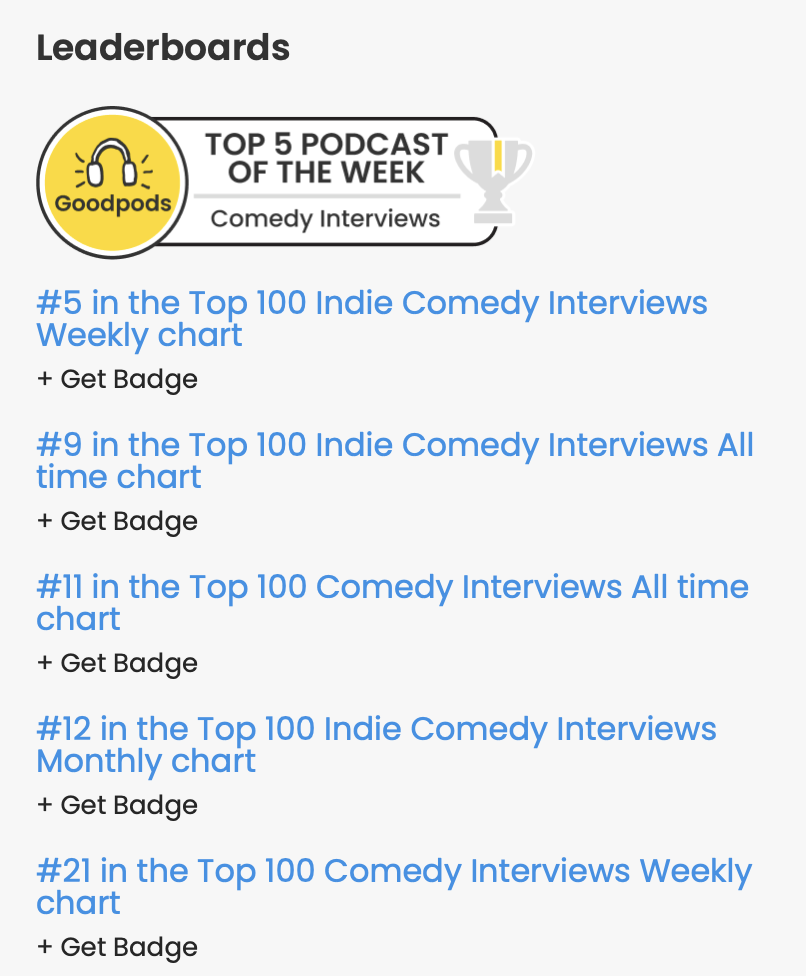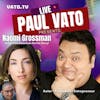
Creating The Life And Love Life That You Deserve Today With Actress, Writer, Producer And Certified Life And Dating Coach, Natalie Stavola!
If you are feeling overwhelmed by life’s demands, Natalie will introduce clarity and self-motivation and help you end repeat cycles that make you feel stuck, frustrated, or constantly choosing toxic relationships. She teaches both men and women techniques to better manage the emotional stress of everyday life and dating life.

Paul and Natalie were both raised Roman Catholic and share their mutually traumatic family and school experiences. Apparently, Paul still holds a massive grudge against the CCD (Confraternity of Christian Doctrine) kids that used to invade HIS school to learn about Catholicism, of which Natalie was one of them.
We also learn that maybe, just maybe, using tequila to soothe a child's sore tooth and whiskey to settle a little girl's tummy might just not be THAT great of an idea and MAY lead to a severe case of alcoholism and addiction. ¡Olé!
In this episode we learn:
1. The differences in how men and women try to "fix" things.
2. How there is a 12 step program to suit everyone's needs, even yours!
3. How stand up comedy and satire actually helps us to digest information that otherwise would've hit against the cognitive dissonance.
"If you are feeling overwhelmed by life’s demands, my services aim to introduce clarity and self-motivation and end repeat cycles that make you feel stuck, frustrated, or constantly choosing toxic relationships." - Natalie Stavola
Natalie Stavola is an actress, writer, producer and certified life and dating coach with a degree in psychology.
She specializes in toxic relationships both on and off screen and helps people overcome their insecurities and turn their fears into strengths while being an example of practicing what she preaches.
She breaks out of limiting beliefs while coaching others on how to do the same.
Originally from the northeast and currently residing in Los Angeles, Natalie has kept that east coast edge with an added Cali ease. Sharp wit with a cool vibe. You can see her on Amazon Prime or interviewed recently on the CW.
PAUL VATO
Paul Vato is an actor, improvisor, comedian, poker player, podcaster & entrepreneur.
Connect with Paul Vato across all social media at: PaulVato.com
SPONSORS
- Buy The Kama Sucia aka The Filthy Bed at VATO.tv. Thank you!
- Play on ClubGG Poker with over $200,000 worth of prizes every month! bit.ly/ClubGGVato
- Monetize your time & knowledge w/Owwll. Enter referral code "VATO" at sign-up to get $10 to use on the app: Apple: apple.co/35HC0hd • Android: bit.ly/OwwllGooglePlay
--- Send in a voice message: https://podcasters.spotify.com/pod/show/paulvato/message
Help support the podcast and buy The Kama Sucia at VATO.tv.
Are you a podcaster and/or a social audio enthusiast? Join the Podcast Éclat Mastermind & Think Tank at PodcastEclat.com.
Check out Paul Vato's Step by Step Podcast Launch Course & Ignite Your Brand's Voice! Available at PaulVato.com
Natalie Stavola
Paul Vato: Welcome to Paul Vato Presents and my guest today is Natalie Stavola. Molto bene, grazie e benvenutto! Are you Italian? I don't even know.
Natalie Stavola: Yeah. I'm third generation Italian, I'm also Irish so inside there's just like constantly fighting.
I was raised Roman Catholic. I've tried different religious organizations, tried some different ones out, landed on spirituality. Kinda have my own thing going. Yeah, it's very big. I'm originally from the Northeast. So we're really big on like that Roman Catholic, Irish, Italian. I did the whole thing, got confirmed, had my first holy communion, all of it.
Paul Vato: I love it. I'm there with you. I did time myself, I did 12 years myself, of hard labor in Catholic Parochial school from kindergarten...
Natalie Stavola: YES!!!
Paul Vato: to 12th grade. I feel your pain.
Natalie Stavola: What I love though is, growing up, being an actor in my household was very like taboo. Wasn't really allowed cuz it, you know, back in the day they were like, you're not gonna pay bills with doing that. Do you remember, did you ever have to go to CCD?
Paul Vato: I went to Catholic school, so I thought CCD was for public school kids that didn't have religion in their life, you know, so they had to go to CCD.
Natalie Stavola: So what it was was because I didn't go to like a Catholic school, we would do like the after school programs and then we'd go to CCD after. The best part about that was whenever I went, I was always, my nose in a book or always just kind of like doing my own thing. And I guess maybe they recognized that, the nuns there or whoever was there, I think it was nuns, they would actually, or the volunteers, I can't even remember, pretty sure nuns. They actually would have an acting program, like a little theater thing, where, after class, after every time you did a little CCD class, a little Catholic class, if you will, everyone would gather together in the auditorium and there'd be a little presentation, like a play like David and Goliath or whatever. I would skip CCD really, and I would always do the plays and like practice for the plays, cause I would get pulled outta class cause I'd be like, oh, do you wanna do the play? I'm like, yeah. So I always used to joke with my mom that I was like, you know, I really started acting in CCD, so shouldn't have put me in it.
Paul Vato: She got what she deserved. I always had an issue with the CCD kids. I think, when you're going to school, especially like a small Catholic school or parochial school, you don't realize that there's this outside world. That's like seeing your teacher, at the Kmart, or at a store or at a restaurant, you're like, it's so weird. So for us, I knew that this is my desk. This is my desk! We'd come back and the CCD kids they were just vagrants, they would mess it up, they would write on it, they would destroy our stuff and we were like, why are other people using MY desk, and then not respecting it? Fine, I get it that they need Catholic education in their life because their parents, you know, don't love 'em as much as my parents and send me to go to parochial school, you don't have to come over here and destroy my desk and carve your initials into it. Hooligans, vandals. That's what I thought of CCD kids.
Natalie Stavola: Oh my God. I mean, it makes sense. Although too Catholics though, cuz I feel like, we already, when we were doing CCD, we were already rebelling at a young age. You guys, I feel like later on like when you go into college. Wow. Wow. It's like you guys were way too in a plastic bubble where you're like, wow, I remember my first time.
Paul Vato: I know that I had a sip of beer, once, growing up. Believe it or not, my father would let us take a sip, but that was it. I never got drunk before I was 17 or 18. The kids I grew up with, they were like, oh my God, we started, you know, drinking when we were 12 or we'd sneak cigarettes at 13. I didn't. So college was quite the experience, you know, forget the freshman 15, I gained the freshman 30. I didn't even like beer, I'd taste it and go, this is horrible. How can people drink this? But then, I just loved drinking.
Natalie Stavola: Exactly. The effects produced by alcohol, it wasn't the taste. I'm Irish / Italian. Especially on the Irish side, back in the day, a lot of the things, they really believed this, that like if a baby was crying and teething that you would numb the gums with whiskey. I have that past that's in my lineage. Like we would do that. In Italy and my father's side, you go over there and like, wine is like you, they don't have an age range for when you drink. You can be 10 years old and have a glass of red wine for dinner. They also are taught to not abuse it versus like here we're like, woo. I don't know if they gave me whiskey when I was teething, but my first shot of whiskey was when I was like six. I remember I had like a stomach ache and I remember man, my grandma pulled out this like old, like from like she, like, I couldn't sleep. I was really sick. I had a tummy ache. Um, and she, she just, I remember she just pulled something out from like behind somewhere, a cushion or something. It was this weird looking statue type of a bottle. Poured me a shot. I put it down, warm. I went right to bed. That was...
Paul Vato: I just realized, I do need therapy because, the way we grew up, there is no such thing as therapy. Just like you said, you know, they don't respect the acting, the arts. There is no. Oh, oh, you know, yeah, everyone has it hard. Just suck it up. I need to get to therapy. I just realized that's the reason I became an alcoholic, I'm guessing. I remember even going, like my tooth hurts, it didn't hurt, but I knew that they would rub, we got tequila, now I could, I just realized no wonder I liked the smell of it because I remember as a child teething and then they would rub, booze. The thing is my mom never drank. They got bottles and bottles of alcohol for their wedding when they got married back in the sixties. 30 years later, they were still around, she never opened them. She never drank. She would claim to get drunk even when she went to mass and had the Blood of Christ and had a sip of wine. "I can't, I'm lightheaded". I'm like, that was nothing. It's their fault. Okay. I gotta go to therapy.
Natalie Stavola: Yeah. I mean, for me, like I'm an alcoholic alcoholic. So at this point now I'm like five years clean and sober, it's genetic on both sides. So it just depends. I think that trauma can have you escaping in drugs and alcohol. However, I do also believe that with some of us, we are born with that disease because even before I took a drink, even before anything happened, there were, there were noticeable things that I was doing as a kid that were very like what you would consider "alcoholic" before drugs and alcohol ever came in. I would do things very obsessively. Even like the way that I kind of thought and felt. Some of this stuff is very indicative of addiction. So you could kind of like, you could kinda tell when I was a kid and then, you know, once I got drunk that first time it was game over, I was off to the races. I was like, this is it, found my first love. Peace! .
Paul Vato: How old were you the first time you got drunk?
Natalie Stavola: First time I got drunk wasn't until I was like 13 or 14, before that, I actually hated alcohol. I hated the taste of alcohol. I saw alcoholism in my family and I swore I would never, ever, ever, ever, ever be like that. Cuz I saw how embarrassing it was. I saw the effects. I was convinced that I was like, I will never touch a, I'll never do that. And I would have a sip every now and again, but I never got drunk. I never liked it. But the moment, the moment that I actually got drunk, it was like game over.
I was about 13 or 14 and it was Bud Light Budweiser, tasted disgusting, but I was like in the bathroom, I remember, and I had just like chugged one and I like went to stand up and I felt that like, whoose. And then suddenly for me, what happened was, I didn't care anymore. The voices in my head stopped, screaming at me. I didn't feel so like off in my own skin or feel like weird or othered or less than I just didn't care anymore, and it was lovely. Drugs and alcohol got me through some tough times. I'm an alcoholic, I'm an addict. So if I put anything in me, I can't stop. I don't have control over it. It's like I'm not present, not here. I did eventually hit a bottom about five years ago, a little over five years ago. Thank God. Thank goodness. Wound up getting sober and just no drinks, no drugs in me ever since, and it's been great.
Paul Vato: Good for you, I'm glad that you were able to get on top of that. I've stopped because now as I've gotten older I black out and it takes less, less for me to black out. I'm the life of the party up until that certain point. It's that old joke of having a martini. One is not enough, two is just right but then three is not enough. After that I can't have enough, you know, so.
Natalie Stavola: Exactly, exactly. That's exactly how it was, I couldn't do it anymore. I was like, oh my God. It was too much, too much. So now I'm like, Nope, we're good. I miss it. All my friends that can still go out there and drink, but then like age comes in and you're like, Ooh, I cannot, I got a headache for a week, forget it, I'm done!
Paul Vato: Did you go through a program or what got you through or what's getting you through not drinking or addressing, your alcoholic...
Natalie Stavola: Oh, a bunch of things, a bunch of things. There are 12 step programs out there, so if anyone's listening and like struggling with it, I highly recommend 12 step programs. I've done a bunch of stuff and I stay in it, I stay on top of it. I go to therapy, I have a coach. I have a slew of different things. I highly recommend 12 step programs for sure. I didn't go through detox or rehab, but like, those are even fantastic, you know, to help clear someone out so that they can kind of like just stable off and then get into a program.
I do a bunch of different things now. I stay very grounded. Now I have a few different practices, things that I do, and then some things that I can talk about, which are like, journaling and meditation and gratitude lists. The daily things that I need and have to do to like lower my heart rate so that I'm not impulsive, able to make the right decisions, able to connect to myself, kind of get centered, listen to that intuition as opposed to that trauma and then go from there. I recommend 12 step programs. They're anonymous, so I can't say whether or not I'm in any, but I definitely recommend them.
Paul Vato: Can you tell us other people that are in them? No, I'm kidding.
Natalie Stavola: Yeah. Right. Sooo.
Paul Vato: Sooo, Andy Dick...
Natalie Stavola: The only reason why it stays anonymous is because sometimes, what can happen is, if people identify someone, like you've seen some celebrities that have come out and said it, which is fine, they have every right to do that. Most of the reason why a program will, should stay anonymous and will stay anonymous, is because if someone comes out and says, I'm a part of this program, and then specifies which program, oftentimes, what can happen is, is that people can look and if that person relapses, then they go, look at that, that program doesn't work and it can wind up taking people out and having people base their experience on that one person, who's a flawed human being. I am a flawed human being. I am not perfect. I make mistakes. I mess up. So if I say I'm part of a program and then I mess up and do something, then people can go, oh, look at that, it doesn't work when it's like, no, no, no, no, no, no. Just because I'm a degenerate that didn't like, do what I was supposed to do does not mean that it doesn't work. It means that I didn't work it. That's a whole different, so that's why we typically won't talk about that. 12 step programs are lovely, and there's a 12 step program for literally everything, like everything. If you have a problem with something there's a free 12 step program for it. I love that. I love that.
Paul Vato: Are you open to people reaching out if they just need a little direction as to you point them in a right direction or is it as easy, just Google it, you know, 12 steps?
Natalie Stavola: You can literally google it. I don't mind people reaching out. Every year on my sober birthday, sober anniversary, I definitely announce it. I'm very big on, I am an alcoholic. I am an addict and I love that I am, because I think I also think too, that a lot of artists are because it's just the way our minds work. It's beautiful. I love our minds. I love the artist mind. I love the addict mind. It's amazing. So I've had a lot of people reach out. There's just a difference if someone's in self pity and they're just wanting attention. Nah, I'm not gonna write you back. That's annoying. If someone is actually like, I need help, then I'm like, here's a link to this, check this one out, let me know how it goes. Call and reach out to people. Cause that's been my experience, for me, when I first got sober, I wanted other people to just give me money and give me everything and give me the answers and I didn't wanna do it and I didn't wanna feel, and I didn't wanna do the work and you know what? A lot of it is like these programs teach you how to actually show up for yourself and stop destroying yourself, which means that it's like you do the work. I don't do the work for you, which actually helps me better with boundaries, people pleasing, all of it. I'm less likely to people please, cuz I'm like, no, I had to do my own stuff. You do your own stuff, go do it, follow the program, go.
Paul Vato: Is there a difference between men and women? I feel like men are just like, well just gimme the fix, how do we fix this, or is that just a human thing?
Natalie Stavola: It's a human thing. I think how we say it or how we interpret it. Men will go with like the term more "fixing" women too though. I don't know really what our term is. Because remember we wanna play with broken. We wanna fix broken. We wanna nurture broken. Men, wanna fix broken, women wanna nurture broken. It's still fixing. It's just how we say it is the same thing, but getting a fix, a quick fix, anything like that, so human, so, so human.
Paul Vato: We are the same. Speaking of the same, I just realized, I guess you got the memo, we're wearing official colors.
Natalie Stavola: YES! I got the memo and you have a black shirt underneath, right? It's black and blue.
Paul Vato: I do. I do. You've got black on the outside. Wow.
Natalie Stavola: I even painted my wall for you too. I was like, heard.
Paul Vato: I love it. I love it. Is that where you audition? That's a great backdrop for auditions. It's not white, it's gray. It's beautiful.
Natalie Stavola: I had another wall in my apartment that I painted and it's a beautiful color. But, it's a pain in the butt to keep setting up my lights on that wall and moving things and moving things off the wall that I'm like, forget it. This I wanted to accent anyway. So I'm like, oh, well this works.
Paul Vato: Perfect. It's a great backdrop. I know that it shouldn't be stark white. I'm thinking about painting one of my walls. Yeah. Because I basically that's, you know, I work where I live, type of a thing.
Natalie Stavola: Same.
Paul Vato: For auditions and, and whatnot. Have you been working lately? I know that you're an actor, you're a writer, but I really feel, a lot of your calling is being this certified life and dating coach. We'll talk about that, but have you been acting, or can you tell us a little bit about your background as far as acting goes?
Natalie Stavola: Oh yeah. Thanks for asking. So a lot of it too, is that like my acting life, my filmmaking and my dating coaching life and dating coaching, they're all the same. It's all the same through line. I overcome obstacles. I overcome my trauma and I either show you how to do it in a movie or I'm teaching you how to do it on a phone call. Either way, it's the same thing. It's a hero's journey. And then I'm either teaching you to have yours or you're seeing it on the screen. So it's all the same through line. Because when you're filmmaking, even if it's a comedy, you know, this, you have your journey, you have an inciting incident, obstacles, how you're overcoming it, that cathartic release, where you're overcoming, no longer playing and staying the victim, and you're winning something in the end. Even if your character dies, that's still a win. That's just how we act anyway. It was my choice, to go. Ah. It's all the same through line. So in my own life, I am a big proponent of, I practice what I preach. I'm telling my clients and teaching my clients, journal, meditate, affirmations every day, uproot your limiting beliefs. Let's turn your trauma and insecurities into your life purpose. Let's go. And I'm actively doing that in my life. I'm doing standup comedy now. I broke through that fear, always wanna do it. For acting, I just shot a film last year. That's coming out. I Possessed, that's a psychological thriller, that one's coming out. I'm also a producer. I've got like two films that we're producing right now. One that we're getting green lit for pretty soon. We're in pre-production for. I'm shooting a movie next week. I'm then auditioning, you know, and then I'm also writing. I've written a pilot. Right now I'm writing a TV show with another writer. There's a lot.
Honestly, sometimes I forget. Sometimes when I'm like, oh man, I'm not doing enough in filmmaking. I forget that I'm literally like, I have two films coming out. I've got a film on Amazon Prime right now. I'm writing, I'm producing, I'm acting in. There's enough. There's plenty. I'm like, oh yeah, it's right in front of me. But I always want more.
Paul Vato: I hear you because sometimes it's like, yes, yes, yes, I can take on another project. I'm like, wait a minute. My plate is really already full, but we forget how many things we're doing. I don't know if it has anything to do with, you know, I'm a Scorpio. I love starting new projects and doing that, but then it's staying motivated. So this is why I'm loving this podcasting, and it has slowed down a little bit, but I started off pretty fast. It's been a couple months, maybe two and a half months and, maybe 30 some episodes. I'm just afraid that that's gonna, you know, go by the wayside. I think it's because I'm meeting new people. Meeting great people like you that are inspirational, that are motivational, that are both artists, but also have this business side to him, which is me, exactly.
Natalie Stavola: It's wonderful. I know what you mean. That feeling of like, how long is this gonna last? How much work do I have to put into this? Seriously, that's why like staying grounded. Huge.
When I'm in fear and my heart is racing a mile a minute, it's just like my feet aren't on the ground, that's when I can wind up getting in fear and feeling like, you know, I don't have everything going, right. I don't know. I'll just make simple, silly, little mistakes as opposed to like, when I take that step back and I just breathe, and see, and like go into gratitude of like, what are the things that are going right in my life already? What are things in front of me? It's like, oh yeah, I have plenty. There's plenty, I need to switch back into that abundance mindset, which is like part of the trick to manifesting.
Paul Vato: Wonderful. I love it. And obviously then you use this when you're coaching, because you're a certified, life and dating coach. I tuned into your Instagram Live. It's just fascinating, the things that you were saying. Great job with that.
Let's quickly tell people where they can find you. I did put your Linktree right in the fortune cookie, so if you're here live with us now, on Fireside, you can click on it directly. You can find me at PaulVato.com, but you can find Natalie via her Linktree and all of your social media is there. Is that where people should find you, Instagram?
Natalie Stavola: Oh yeah. I've got a YouTube channel now I just started, I gotta post that. I'm gonna be starting a podcast pretty soon with a friend of mine. We call it, Shooting the Shit, Talking Shit and Handling Some Shit, and overcoming some shit. It's a real shit. It's good. My best friend for like 20. My website for coaching is, LoveCoach247.com. I've got a 90 day transformational program coming up in like a week and a half. I take you from toxic cycles ending and breaking those, to triumph in your life. Mostly focused on the love life.
Because of what I do and the way I coach it stems from you and like how you're treating you, what you're doing with you, how you're speaking to you. You'll just watch as like it manifests all over in your life. Solid partnerships, better boundaries, better relationships with friends and family members. And then career takes off. I don't think I have any clients where whenever I'm coaching with them and we're really unblocking some things in their love life, their career takes off.
IMDb is in there and you'll see all the things that I have going on and some of the projects that are in pre-production right now and some that are coming out. I Possess is coming out soon. I'm so excited about that one. Yeah, there's a lot of links. There's a lot of links. And then my social media. Instagram I'm at Natalie Stavola. If you just Google Natalie Stavola, you'll find me everywhere, I'm on all the platforms.
Paul Vato: I love it. I love it. I love it. This movie, you're an actor in it, I Possess?
Natalie Stavola: Yep. I'm one of the leads, there's like four or five, it's a ensemble cast and I'm one of them.
Paul Vato: Ohhh, I look forward to watching it when it comes out. What's the expected date of it to come out?
Natalie Stavola: I can't remember right now. Right now. They're still in post and they're still finishing up editing. They've done some test runs, where they've had some people come in and watch it and give feedback, and the feedback's been phenomenal. But they're still finishing up some final touches with special effects. It'll be within the next couple of months, like it's coming out soon.
Paul Vato: Hopefully I can get this out before your 90 day program starts. What's the expected date for that to start so that people can join you? I dunno if you wanna talk about the fee wise or if it's more of a personal thing and you'd rather them just hit you up.
Natalie Stavola: I would just say the email, because there's price breakdowns too, and there's like monthly if it's needed, but then there's a discount if you pay, like for the three months. There's like 10% off if you do all that. It's worth the investment, we'll say that. I worked with mentors to price point that out and make sure that it was reasonable for people to invest. It allows me the ability to like, be one on one, cuz what it is is it's gonna be three months worth of one-on-one coaching sessions. We'll be tackling traumas, we'll be overcoming and ripping those out. Discovering what's blocking you, removing those blocks, and then in the third month you'll be manifesting. I see this all the time. I've been doing this for years. You'll watch as like people will gravitate toward you, careers will take off, more dates will come in and I'll be there to like hand hold and walk you through that way as you're doing it, you're not like, oh no, what do I do here? What do I say here? You'll have me. I'll be like, say this, do this. My goal and what I do and how I coach. I'm not really big on people becoming dependent on me. I would rather you become interdependent, where we are connected with each other. I'm not hyper isolating, but I'm not like needing you for the rest of my life. Quick fixes here and there. Cuz I still have coaches. I still have therapists. I'll have that for the rest of my life. I love that. But what my goal is is that after those 90 days you're gonna be set with boundaries and a clear set of directions as far as like for the rest of your life, what you say "yes" to what you say "no" to and how to add to that list and you'll be able to move forward and know exactly what to do in any given situation.
Paul Vato: It sounds like an amazing program and I wish you the best of luck. That's wonderful that you're bringing this to the world. I know that I've heard you speak on Clubhouse and on your Instagram Lives, you have such wonderful knowledge to share. It's great that we're able to do this because again, like I wasn't raised with that. We don't know anything about therapy growing up.
Natalie Stavola: I know, right?
Paul Vato: So this is great.
Natalie Stavola: I know. And I got a degree in it. I have a degree in psychology. It drove me nuts because I would still get involved in toxic relationship after toxic relationship, narcissist after narcissist, sociopath after sociopath and I couldn't understand it.
I come from a lot of trauma, severe people pleasing, severe codependency. I would try and move in with someone after the first date. I just didn't understand it. I didn't get it. I had a degree in it, but what I came to find out after doing a lot of work, a lot of therapy, a lot of work, a lot of inner work and then getting more, certified, and then finally falling on my butt and really having to like do a lot of the internal work. You have to reprogram your subconscious mind. Like you have to get back there. Otherwise you're just gonna watch even an awareness as you do the same thing over and over and over again, and get very frustrated with yourself. Like I know better. I know better. Why can't I do better? That's because that means that there's a trauma point, limiting belief back there that you need help with. You need someone that comes in and goes, come here, gimme that, SNAP!. There you go. All right, you're good. Go off. Go, go have fun. Which you can see in today's world. We have a lot of people that have a lot of fears and a lot of trauma, and they're being programmed with like hate and propaganda and like misinformation. And you're watching as these people are getting incentivized and entitled to ignorance and entitled to disrespect of others. And you're like, what the, what is this? When we've had a lot of narcissistic abuse or psychological abuse, which there's a lot of countries that have it, America is one of them. When you have that, when you have a lot of psychological abuse with things, especially for certain communities in America, what winds up happening is you get something with like Stockholm Syndrome.
You have some people in America that are treated really well. Some people in America that are not treated well. And then people in the middle that go, well, it's not that bad. So they gaslight the oppressed communities. It's not that bad. Be quiet. You're making it up. You're being loud. Why can't you protest? All of a sudden fear mongering in one side. What happens in America, especially is that like these two people, two groups or multiple groups, everyone is taught to fight with each other and that it's their fault and your fault and it's this person's fault. Meanwhile, the people making all the money, and money hoarding and greed hoarding, the ones that are putting people in prison. The prison system generates $11.2 billion in revenue, $11.2 billion! Why on earth is our private prison system able to generate this much income? And yet we're paying for that.
People make money off of Americans staying dumb, staying poor, staying broke, staying angry and staying fighting with each other. There's a lot of people making money off of that. My hope with empowering the individual and helping the individual, overcome their trauma is, and what I've noticed in my coaching, the more that I'm able to, and the more that I do it within myself too, cuz I've had to undo my own programming. I've been someone that's gaslit. I've been a moderate. I've been someone that's not understood because I've walk in the world with this. So the more that I've been able to help an individual see their own trauma and see themselves more clearly, the more that I've noticed as they've been able to see others that maybe look like them or don't look like them more clearly. They've been able to no longer gaslight and dismiss and invalidate the experience of another human being and instead kind of be side by side, realizing that we're all in this together. I specifically mostly coach men. I do coach women too, but I love bridging that gap because we are all in this together. We all have different traumas that have kind of impacted us. Men are taught that, you know, you're only allowed anger. Women are taught that it's our fault if something happens to us, we don't even have a right to our own bodies. The black community is taught that black is bad and you're bad and wrong. Then the brown community is like you're gangsters. There is these beliefs, and these limiting beliefs, that are pushed on us, and so our job on the individual level is to break those chains. That's all that's needed. Just by healing and overcoming your own stuff, alone, and being able to see yourself more clearly, that alone is enough. That's enough to break and actually create a positive impact because everyone that you interact with the way that you speak to yourself and speak to others is going to change because you're gonna be treating yourself with more respect. You're gonna be treating others with more respect.
Paul Vato: Right, right, right. I'm, you know, I'm guilty of a lot of those things that, that you said where, which is kind of like, well, just get over it. Just deal with it. I mean, I just have to deal with it. I got over it. Why can't you get over it, but you're right. It's such limiting and dismissive behavior. So thank you for bringing up.
Natalie Stavola: By the way, I've done the same thing. Shoot. Sometimes I actually still do. Ooh, I got yelled at, by one of my friends, it's an older woman in my life, that's gone through some stuff and done some work on herself and she goes, you know, the way that you treat yourself is the way that you treat me and the way that you treat the people that you love and I'm done being put on the back burner. You keep dismissing yourself and that's how you keep showing up to your friendships. And I was like, woooooo. I needed that lesson thrown at me that way, cuz I wasn't hearing, I wasn't, and that lesson had to get really loud and I realized it was a beautiful moment. I was like, oh my God, thank you. Thank you, cuz I was like the way that you treat yourself, the way that you speak to yourself and the way that you see yourself is the way that you will treat the people that you love, the people that you've deemed safe and the people that look like you. If I'm looking in the mirror and I don't like me, then anyone who looks like me, I'm not gonna like.
Paul Vato: Wow. Yeah, yeah, yeah.
Natalie Stavola: And I'm gonna treat them badly by accident. I'm gonna dismiss them. I'm gonna be rude to them, gaslight, because then do it to me. Here's the thing. It's part of the human experience. We grow through that and then we get to see that, undo that and go, oh wow. And because of that, that creates empathy. If you don't experience sadness, you will have no idea what joy feels like. If you don't know what it feels like to, hate yourself, then self love the beauty of how it feels when you like, just honor and cherish and respect yourself and others. It's such a powerful feeling. It's like, I don't know. It's like seeing the world for the first time, yet you've been here for so long, but it's like you have a new set of glasses and new pair lenses, like getting LASIK.
Paul Vato: Wow. Wow. Wow. It sounds like a wonderful, wonderful program. And again, for those that are just tuning. Where can people connect with you so that they can either sign up or learn more about your upcoming 90 day program.
Natalie Stavola: I'm actually joining a platform called Vibely. This platform reached out to me and I really love their community. I'm actually gonna be launching my 90 day program with them. So if you go to Vibely, V I B E L Y, it is an app and a desktop, so you'll be able to join along and do things and I'll have weekly and monthly, little like challenges and everything. My community will be on there that I'm hosting the 90 day platform. So Vibely.io, I wanna say is the website. I'll have it in my Linktree. My Linktree is, Linktr.ee/NatalieStavola. I'll mostly be posting this on Instagram. So if everyone wants to follow me on Instagram.com/NatalieStavola, I will be posting all of the information, the 90 day, how to contact me for that. You can DM me the word "confidence" if you want. That way I know to like specifically send it to you. I've got a flyer, then we'll get rocking and rolling.
Paul Vato: Wonderful. Wonderful. How does your family feel about this? Do you ever expound your knowledge upon them or is it more, unless they ask you, you're not going to reach out to help?
Natalie Stavola: Great question. I love this question. I FORCED my healing on them for a little while. Then I realized that that was outta fear. It's out of fear. And then instead, what I did was I realized that my experience is not their experience. For instance, my brother and I grew up in the same household home, but he has a different set of things that happened, of perceptions, of how he viewed the world then I do, and I think for our family, we can get more triggered because we love them so much and because we all have the same buttons, they installed them. We have the same buttons that get pressed. The same triggers, the same generational trauma, but how we receive and perceive information will be different. Some of the traumas will be different. Some of the limiting beliefs will be different.
I realized that, the more that I heal, and keep to my lane and my side of the street, and when I'm asked or I ask permission first, before I insert, you know, what I think, the more that I've watched as being an example and healing and just being there and communicating and walking alongside, alongside someone's journey has had the most impact.
Today, my family, we are very close, very close. I'm extremely close with my brother. He's got a daughter now. I love his wife. His wife is one of my favorite human beings on the planet. My father I've watched him grow as a man too. He is an older man and an older generation. Not old, but older than me, obviously. I've watched as, he's just like, man, overcome so much and we've gotten closer. My relationship with my mother has gotten a lot better too. It's mostly just been with, honestly, me backing away and having boundaries. The more that I've had boundaries and the more that I've respected myself, the more that I've learned how to communicate and honestly leave people alone and let them have their own journey, instead of me inserting my journey in their experience. The more that we've actually been able to open up and share. So when my brother comes to me or when my father comes to me, there's boundaries in place. One, which means my boundaries, which means I don't cross the street and onto your street. I don't insert my emotional opinion into your experience. And if I'm feeling drained and overwhelmed, then I take myself and take a nap first. But when my brother comes to me and we just talk about life, about how we're experiencing things. He has things that I can learn from and vice versa. I'm the older sister, I'm the big sis, but you know what, he also has an experience in this world where I get to ask him questions and honestly, for the first time in my life, I finally came to my family and asked them for help. Like I was going through something and it was really rough and I've always been the parental figure in my family. The, come to me for advice, which is very ego based, it's very ego based. It's very closed off, sometimes, self-righteous sometimes. I have my own default and my defects, a character, if you will. Instead one time I reached out to my family and I was going through something and I'm like, Hey, I'm not feeling safe in the world right now. I'm feeling very unsafe and I need to feel safe. I know that I've never come to you guys before. I've never asked for help. I've never been vulnerable, but I need you. And I let 'em know. I'm not doing well right now. The light's dimmed in my eyes, and you're not gonna see the same Natalie right now that you're used to, and it might be scary cuz I'm going through something. And my brother was like, fly out, we got you. We got you.
In order for me to connect, I need to be willing to be open and I need to be willing to also ask for help. That was one of the most beautiful experiences in my life. I scared the crap outta my family. It was 2020, and I went through something pretty gnarly in 2020, as we all did, a lot of us did. But I really saw the world more clearly. It rocked me, really rocked me. I am grateful because I got to see the world, a little bit more, through the eyes of those who have been speaking on it for centuries.
It was scary and I had to go through some stuff for sure. My family, my friends were there to kind of carry me through and because of that, I've been able to get a deeper level of healing and a deeper level of trauma work. And I got to jump into like, you know, let me move through white saviorism, white fragility, how to move through those spaces. How to ask questions, how to just kind of show up and kind of go, all right, I'm here. I'm seeing it now. What do I need to learn next? Cause I saw it. I was always aware, but I didn't seeeee it. It was like what you said, "What do you mean? It's not that bad. It's not as bad as it used to be. You should just show up, just shake it off. Just walk it off. Toughen up, thick skin." Yo!
Paul Vato: Yeah. Yeah, yeah, yeah. I'm gonna try the same thing. I'm gonna see if I can call your family and see if they'll fly ME out.
Natalie Stavola: Yeayeah! It's a lot of humor, a lot of good food, a lot of Italian talking.
Paul Vato: Wonderful. Natalie, thank you so much for taking time, for being here and for sharing your world with us, the acting, the writing, especially the life coaching and dating coaching.
You did mention, and so I'm just trying to clarify, you said both on screen and offscreen. When you're talking about on screen, are you helping people with their scripts, or are you on set, helping with these relationships?
Natalie Stavola: Sure. I can't change who I am. If I'm on set with everyone and someone's going through something, I'll ask some questions. I'll see it. I'm there. I show up. I'm of service to a project, whether I'm producing it, acting in it, writing it. I'm here to be of service. I've been given some skills and some things, and this is what I do. When I'm acting, we create roles that are very much based on reality. When I'm acting in a part, I am putting the things that I need to overcome in my own life, and I'm putting this in the character. I'm merging my life in the character. And I'm seeing, where is this character? Who is she? What is she going through? I'm putting in these experiences and it's real. So when you're watching it, you're watching someone go through something difficult where they have to overcome something and you're relating to that character and because that character is getting that cathartic release at the end, overcoming their trauma, overcoming their insecurities, winning at the end, getting the guy, getting the woman, getting the job, getting the, whatever, overcoming their addiction, whatever it is. That, there, because it's a journey that I'm actually experiencing as I'm acting, you're watching it, and for the most part, you're an audience member. And for any piece of art that we connect to, you're putting yourself in there and it gives you hope. That's what filmmaking is all about. Even if it's to laugh or cry or escape, whatever it is, it gives you something that we need. The arts are integral. The arts are something that has never gone away. Even when we're in a recession, we need it even more. The arts help humanity. They help us grieve, they help us move.
Stand up comedy, satire, actually helps us to digest information that would otherwise would've hit against the cognitive dissonance. When we laugh, and our guard is dropped, it's how we can receive information that might have, like, we would've gone, "no, no, no, no". Comedy is imperative, you know, it's drama, moving through those emotions, allowing ourselves to feel, to grieve to whatever it is. That's why, for me, filmmaking and coaching are very, very, very synonymous. They're on the same plane for me.
Paul Vato: I love it. I love it. Well, thank you. Thank you just for clarifying that. And I know that we touched on it at the top of the show, but I kind, I think I just kind of wanted to, to bring it back. I hope that one day we get to work together, whether it's through coaching, especially the arts. If you need a funny guy, I mostly do comedy. But I was on a soap opera for a couple months. So, you know, I can also do the drama. I really hope that we get to work together.
Natalie Stavola: I would love that.
Paul Vato: Have I told you about Owwll or did I get you on Owwll yet? I think you would do great on this app that I'm a brand ambassador for called Owwll with two Ws and two Ls.
Natalie Stavola: I'd love more information on that. Yeah, absolutely. Send me over some stuff.
Paul Vato: I will send it to you because if you download it you'll get $10 to use on the app, but I think more importantly, we would love to have you as an expert on the app. If you use the code "VATO", V A T O, in all caps, you'll get that $10 so that you can try the app. More importantly, I think that if you would apply to be an expert on the app, I think you could help a lot of people, but you can also use it to funnel people to your program. Kind of like a little pre-interview of, do I wanna work with this person? Does this person wanna work with me? There's different ways to use it as another tool, to get your knowledge out there.
Natalie Stavola: Yeah, I would love that. Absolutely. Sounds good. Awesome.
Paul Vato: Anything else that you'd like to chat about or any final thoughts that you'd like to leave us with? We would love to hear from you and then hopefully you'll come back or anytime that you're promoting something, I'd love to have you back on the show.
Natalie Stavola: Absolutely. I think just leave with this. The trick to getting everything that you want is by feeling it and experiencing it and giving it to yourself now, do not wait. And that doesn't mean that you run off and spend a bunch of money. That's not what it means at all. It means that if you're constantly overworking, cuz you're waiting until you hit a certain amount of money to take a vacation. What you are training your brain to do, this is all neurolinguistic programming, this is neural pathways, this is genetics, all of it, neuroplasticity, and science backed. When you train your brain and program your brain that like, oh one day I'll take a vacation or one day I'll feel better. Or one day I'll do this. When you get to that point, you will be misserable, absolutely miserable. It's often why you see a lot of millionaires and billionaires that are losing their jobs, their careers, their wives, their husbands, just all of it, because they got to that point where they thought that they were going to feel safe and feel better about themselves, and they don't. This is where you'll watch them as they go into egomania, addiction and destroy themselves and those around them.
I'm telling you right now, the trick to getting and receiving everything that you need is when you give it to yourself, energetically, spiritually, emotionally, when you give it to yourself now. If you're looking for a healthy, loving, amazing relationship, date yourself. Start treating yourself the way that you would wanna treat someone else in a relationship, but also the way that you would wanna be treated.
We teach people how to treat us by how we treat ourselves. So it starts with us, which is the most important thing I could ever impact on anyone. It starts with, how am I treating myself and how am I speaking to myself? Cuz that's what I'm gonna allow in my life today.
Paul Vato: Wow. That's so powerful. Thank you. Folks, thank you guys so much for being here. Natalie, again, I can't thank you enough for coming on the show and sharing your wonderful wisdom. I hope that people reach out to you, whether they're here in the audience or later on when they listen to this.
What I would ask of people as a big favor, please visit Apple Podcasts and follow Paul Vato Presents. Maybe if you're so inclined, leave us a short review, even a few sentences and five stars and Spotify. Those are the two main platforms where you can find Paul Vato Presents. We're on all of them. I'm a big fan of Goodpods, which is a great, podcasting community, if you are a fan of podcasts.
I will send you the information on Owwll because I think that you would do wonderful on it. You can find me at PaulVato.com, from there, you can find all of my social media. More importantly, you can find Natalie Stavola on her Linktree, which is Linktr.ee slash Natalie Stavola. Just Google her and find her and follow her across all social media. And I think that those words that you're leaving us with are so powerful and so wonderful. So Natalie, thank you so much for taking the time to be here.
Natalie Stavola: Thank you so much for having me, Paul. This was a pleasure. Thank you.
New to the podcast? Start here.
Here are some of our most popular episodes of Paul Vato Presents!


















































